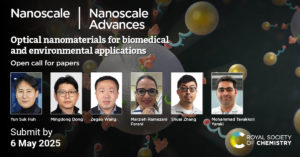Open Call for Papers – Optical Nanomaterials for Biomedical and Environmental Applications
Guest Edited by Yun Suk Huh, Mingdong Dong, Zegao Wang , Marzieh Ramezani Farani, Shuai Zhang and Mohammad Tavakkoli Yaraki.
Nanoscale and Nanoscale Advances are pleased to announce an open call for papers to an upcoming themed collection on optical nanomaterials for biomedical and environmental applications. This collection is guest edited by Professor Yun Suk Huh (Inha University, South Korea), Professor Mingdong Dong (Aarhus University, Denmark), Professor Zegao Wang (Sichuan University, China), Dr. Marzieh Ramezani Farani (Inha University, South Korea), Dr.Shuai Zhang (Pacific Northwest National Laboratory, USA), and Dr. Mohammad Tavakkoli Yaraki (Macquarie University, Australia).
To achieve high selectivity and sensitivity in detecting and quantifying analytes, biosensors with a high signal-to-noise ratio are essential. Optical biosensors have gained significant attention over the past decade. Fluorescent and plasmonic nanomaterials are two key types of optical nanomaterials used in various biomedical and environmental applications. Advances in this field are driven by the discovery of new nanomaterials and techniques. These ultrasensitive optical probes are employed for monitoring and detecting pollutants, as well as for in-vitro and in-vivo diagnosis, visualization, and treatment of severe diseases. They are utilized in both colloidal and planar systems, contributing to improved quality of life and a promising future for research.
The current special issue aims to highlight the significance of optical nanomaterials in detecting, quantifying, visualizing, and analyzing biomedical and environmental topics. It will cover a range of materials and techniques, including:
- Fluorescent nanomaterials (e.g., organic molecules, metal nanoclusters, carbon dots, quantum dots)
- Plasmonic nanostructures (e.g., metal nanoparticles, planar metal structures)
- Various biosensing technologies (e.g., fluorescent and colorimetric biosensors, SERS-based probes, SRS microscopy, microfluidic devices, lateral flow assays)
- Drug delivery
- Cancer treatment
This call for papers is open for the following article types:
- Full papers
- Review Articles
Open for submissions until 6 May 2025
How to submit
Articles can be submitted at any time before the deadline via the journal’s online submission system for Nanoscale or Nanoscale Advances. Accepted articles will be published in a citeable format in regular journal issues as soon as possible and collated into the themed collection online. We are looking forward to receiving your submission, which is welcomed any time before the 6 May2025 so that this collection can become available to you and the community as soon as possible.
Please note that Nanoscale is a hybrid (transformative) journal, and articles can be published either via the usual subscription model or open access (article processing charges are required). Nanoscale Advances is gold open access and requires article processing charges. Your institution may have a read & publish deal in place with the RSC which means you may be able to publish open access in our hybrid journals with fees covered by the institution. Check our journal finder to see if you are eligible.
When ready, please submit your article directly to the submission system for Nanoscale or Nanoscale Advances. Please mention that your submission is a contribution to the “Optical Nanomaterials for Biomedical and Environmental Applications“ collection in the “Themed Issues” section of the submission form and is in response to the Open Call.
Please note that all submissions will be subject to initial assessment and rigorous peer review to meet the usual high standards of Nanoscale or Nanoscale Advances. In some cases, the Associate Editors may offer authors a transfer to Nanoscale Advances from Nanoscale if more appropriate. All articles featured in the collection must be in scope and as such final inclusion is not guaranteed and will be up to the discretion of the guest editors.
We look forward to receiving your latest work and considering it for this collection. Please do get in touch at nanoscale-rsc@rsc.org if you have any questions at all.











